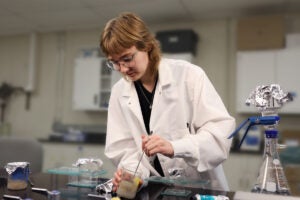James Watson, in opening his Paul D. Gottleib lecture, told the audience he should have seen Austin much sooner.
The 79-year-old Nobel Laureate said he had learned he might get a job in Austin in the early 1950s. Instead, he went to Cambridge, England where he partnered with Francis Crick to discover the double helix structure of DNA.
Watson might not have been in Austin before he gave his Sept. 11 speech, but there was just one degree of separation between him and The University of Texas at Austin.
He received his Ph.D. at Indiana University, where one of his mentors was Hermann J. Muller, who had won a Nobel Prize for work he did at The University of Texas in 1927.
Speaking in the Texas Union Ballroom, Watson drew a large crowd of faculty and students. The lecture series is named in honor of the late Dr. Paul D. Gottlieb, an outstanding professor of molecular genetics and microbiology and director of the School of Biological Sciences, who died in 2003.
Watson’s talk drew from his new book, “Avoid Boring People,” which has a Sept. 25 publication date.
He listed some of the rules he has formulated from his days as a boy in Chicago to his years as scientist and leader of science projects such as the Human Genome Project.
Nearing his ninth decade, Watson retains the gangliness of the 25-year-old who helped of the greatest scientific discoveries of the 20th century.
As he listed his rules for different stages of life, Watson received the biggest audience responses when he got to the university stage.
He declared that six or seven years of graduate education is too much. It should be, he said, four years.
“The job of graduate education is to teach you to become a scientist,” Watson said. “It’s not to do great science.”
He said that anything beyond four years is serfdom for the studentand cheap labor for the student’s adviser.
Watson also offered rules for making great discoveries.
The first is to choose an objective before its time. But you also should have a route mapped out that enables to you make the discovery in three years.
He said he and Crick could see how making models of possible structure for DNA and using information from competing DNA seekers would lead them to their objective.
Watson advised you keep in touch with their competitors.
“They may be the only ones interested in what you’re doing,” he said, adding. “It’s tricky because you don’t want to give them as much as they give you.”
In response to a question, Watson declined to identify the areas of science in which the next big discoveries will come.
Those answers, he said, should come “from these young people,” opening his arms to the audience of students.



